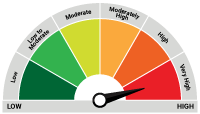What is an Index Fund vs an ETF
Posted On Wednesday, Jun 15, 2022
What is an Index Fund vs an ETF?
Mutual Funds primarily follow either of the two investment strategies – Active Investing and Passive Investing.
Actively managed mutual funds aim to outperform the benchmark index by actively managing the portfolio to take advantage of the market dynamics. On the other hand, passively managed funds, such as Index Funds and Exchange-traded Funds (ETFs), aim to mirror the composition and performance of an underlying index or a basket of stocks, regardless of the market conditions.
Passively managed funds have gained a firm footing among investors, especially in the last couple of years, due to the simplicity of the product and the convenience of investing that they offer.
What is an Index Fund?
Index Funds generally track popular indices such as Nifty 50, S&P BSE Sensex, Nifty 500, etc. A Nifty 50 Index Fund is a passively managed fund that tracks the components of the Nifty 50 index. Thus, you can expect Nifty 50 Index Fund returns to be more or less equal to that generated by the Nifty 50 index. The Nifty 50 index is a bellwether index in India that constitutes the top 50 large-cap companies selected based on free-float market capitalisation.
Index Funds are mandated to a minimum of 95% of their total assets in securities that form part of the underlying index. A small portion of the fund can be held in cash and equivalents to meet the liquidity requirement under the scheme.
The stocks and their weightage in the portfolio of a Index Fund are similar to that of the underlying index. The composition of the scheme’s portfolio is altered only if the stocks and their weightage in the underlying index change. Accordingly, the portfolio turnover of the Index Fund is very low.
Being passively managed, the expense ratio of Index Funds is significantly lower than actively managed funds.
Investing in an index fund eliminates the risk of stock selection arising from any potential behavioural bias/judgement errors of the fund manager.
Another benefit of investing in an Index Fund is that you do not have to go through the challenging task of selecting the best mutual fund from the plethora of actively managed funds available, as all funds in the category behave in the same way. However, ensure that you select the one with a low tracking error and low expense ratio to earn reasonable returns compared to the index over the long term. Tracking error is the difference in returns between an Index Fund and the index which it is tracking.
Index Fund vs ETF
As mentioned earlier, passively managed funds predominantly include Index Funds and ETFs. Though ETFs and Index Funds are similar in many ways, certain factors distinguish the two...
a) Transaction
Index Funds can be purchased or sold just like any actively managed mutual funds, viz. directly through the AMC or a distributor. On the other hand, to transact in ETFs, you will need a DEMAT account and a share trading account since they are traded on exchanges similar to stocks.
In the case of the Index Fund, the NAV is declared at the end of the day; any purchase or redemption will be carried out at the closing value. Meanwhile, the prices of ETFs fluctuate throughout the trading session as per the demand, and units can be purchased and sold (intra-day trading is possible) at the prevailing real-time NAV.
Index Fund can be purchased either via SIP or lump sum mode. Though the option to invest via the SIP is not available in the ETF, you can still invest a lump sum amount in a staggered manner.
b) Expense ratio
The expense ratio of ETFs is generally lower than that of Index Funds. However, the total cost of ownership of investing in ETFs can go up if you can include additional expenses such as annual charges for trading and demat account, brokerage on the transactions, etc.
c) Dividend treatment
When you invest in Index funds, you have the option to opt for a Growth plan or Income Distribution cum Capital Withdrawal plan (IDCW - erstwhile dividend plan).
If you are looking to benefit from growth potential of Nifty 50 stocks, you can consider investing in Quantum Nifty 50 ETF (QNF). QNF’s portfolio comprises stocks that form a part of NIFTY 50 in the same proportion and weightage as that of the index.
4 Reasons why you should invest in the Quantum Nifty 50 ETF:
1. Passively replicates the portfolio and performance of the Nifty 50 index.
2. One of the lowest Expense ratios in the category.
3. Makes it possible to clock returns in line with the benchmark index meaning investors are in tune with the broad market at all times.
4. Allows you to diversify across the top companies in different sectors through a single investment.
To conclude
Passively managed mutual funds such as ETFs and Index Funds, have potential to provide long term Risk adjusted returns. If you are looking to earn returns in tandem with the market, then passive funds are an option worth looking at. However, if your goal is to maximise returns by outpacing the benchmark, you may opt for actively managed diversified mutual funds.
You can also consider investing in a mix of actively managed funds and index funds depending on your financial objective, risk profile, and investment horizon.
| Name of the Scheme | This product is suitable for investors who are seeking* | Riskometer |
| Quantum Nifty 50 ETF An Open Ended Scheme Replicating / Tracking Nifty 50 Index | • Long term capital appreciation •Investments in equity and equity related securities of companies in Nifty 50 Index |  Investors understand that their principal will be at Very High Risk |
The Risk Level of the Scheme in the Risk O Meter is based on the portfolio of the scheme as on May 31, 2022.
Disclaimer, Statutory Details & Risk Factors:
The views expressed here in this article / video are for general information and reading purpose only and do not constitute any guidelines and recommendations on any course of action to be followed by the reader. Quantum AMC / Quantum Mutual Fund is not guaranteeing / offering / communicating any indicative yield on investments made in the scheme(s). The views are not meant to serve as a professional guide / investment advice / intended to be an offer or solicitation for the purchase or sale of any financial product or instrument or mutual fund units for the reader. The article has been prepared on the basis of publicly available information, internally developed data and other sources believed to be reliable. Whilst no action has been solicited based upon the information provided herein, due care has been taken to ensure that the facts are accurate and views given are fair and reasonable as on date. Readers of this article should rely on information/data arising out of their own investigations and advised to seek independent professional advice and arrive at an informed decision before making any investments.
Mutual fund investments are subject to market risks read all scheme related documents carefully.
Please visit – www.QuantumAMC.com to read scheme specific risk factors. Investors in the Scheme(s) are not being offered a guaranteed or assured rate of return and there can be no assurance that the schemes objective will be achieved and the NAV of the scheme(s) may go up and down depending upon the factors and forces affecting securities market. Investment in mutual fund units involves investment risk such as trading volumes, settlement risk, liquidity risk, default risk including possible loss of capital. Past performance of the sponsor / AMC / Mutual Fund does not indicate the future performance of the Scheme(s). Statutory Details: Quantum Mutual Fund (the Fund) has been constituted as a Trust under the Indian Trusts Act, 1882. Sponsor: Quantum Advisors Private Limited. (liability of Sponsor limited to Rs. 1,00,000/-) Trustee: Quantum Trustee Company Private Limited. Investment Manager: Quantum Asset Management Company Private Limited. The Sponsor, Trustee and Investment Manager are incorporated under the Companies Act, 1956.
Related Posts
-

Understanding AMC: The Asset Management Company to Mutual Funds
Posted On Friday, Sep 06, 2024
In the world of mutual funds, the term "AMC" might appear frequently. AMC stands for Asset Management Company, and it manages the operation and management of mutual funds.
Read More -

IDCW Option in Mutual Funds: A Simple Guide for Investors
Posted On Thursday, Aug 29, 2024
The Indian mutual fund industry has grown incredibly fast over the past 10 years.
Read More -

How to Calculate Returns From an ELSS And Its Tax Implications
Posted On Friday, Feb 10, 2023
As you may know, there are multiple tax-saving options in India to save taxes under Section 80C of the Income Tax Act
Read More



